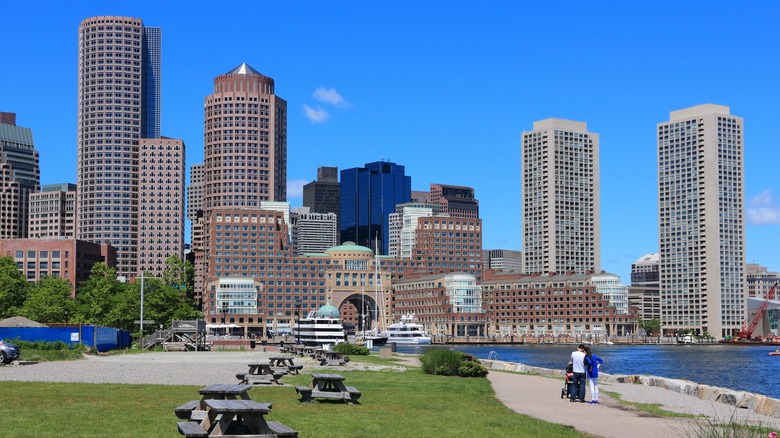Considering Moving? Here's How To Figure Out What City Is Best For You
Moving to a new city is simply a part of life for millions of people. Virtually no one stays put forever, and movement from place to place — either within a small community or between large metropolitan areas — is common these days. My Moving Reviews reports that a typical American will move every five years, on average. These changes of scenery can sometimes take place across a few miles (perhaps from one apartment to another within the same city), but many times they involve an overlap with job changes and other major shifts in lifestyle that demand a more substantial relocation.
When finding a home beyond the community you've grown accustomed to, there are some significant indicators that should be taken into consideration. From the cost of living statistics of the new area to facets of your lifestyle in any new city (such as typical commute times, entertainment options, and criminal metrics), planning a move involves more than simply packing up and hitting the road.
The U.S. News and World Report lists the 150 best places to live every year, and this ranking is a great place to begin when searching for a new town to call home. The U.S. News and World Report analyzes five key index metrics in its evaluation, weighing job markets, housing affordability, quality of life, desirability, and net migration. Each of these five factors is further broken down into subsections that help the outlet classify cities.
Cost of living
Cost of living is a crucial aspect in evaluating any potential new home for you and your family. U.S. News and World Report lists this among the top tier of factors for selecting a new place to call home. Cost of living considerations are seen most dramatically in the average housing prices (either in buying or renting property) but many other essential spending categories also factor into the cost of living that you enjoy in any particular location.
The better your cost of living is, the more free cash flow you'll enjoy to save up for meaningful holidays or big expenses or to use on routine entertainment that makes you and your loved ones happy. One thing that is sure to put a dampener on your new lifestyle is a squeezed budget that doesn't allow for much in the way of excitement and fun. For renters, The Balance recommends keeping your housing expenses at or below 30% of your total monthly income, and Bankrate notes a typical figure of about 28% for homeowners paying off a mortgage rather than a landlord.
Commute duration
The length of time you spend in the car or on public transportation can affect the entire course of your day. A longer commute leaves less time for relaxation in the evening, and it means that you'll have to get up a little earlier in the morning, too. Commute times can squeeze your energy and time in meaningful ways, so opting for the shortest possible commute is often a good idea.
Of course, this isn't always totally within your control. The U.S. Census Bureau reports that in 2019, the average commute (each way) across the United States was 27.6 minutes. This will vary slightly or significantly across local communities, of course, but if your commute is shaping up to be much longer than the typical timeframe in one of the cities you're considering a move to, a different option might be a better choice.
The U.S. News and World Report notes that working from home has become a standard practice across many industries, and this may not shift back toward the more familiar in-office working model any time soon. Still, it's a good idea to think about how much time you might have to spend getting to and from work in the future based on the site that houses your company's offices.
Educational opportunity
Education is a big part of living location for families. The U.S. News and World Report illuminates research that points to diversity and a wealth of options as key facets in the learning of school age children.
If you are moving with a family, then school options are a major component of any consideration. State and local governments, of course, play a role in setting the curriculum that supports the community's education policy and objectives, and local school districts are tasked with enacting these plans and educating children to the best of their ability.
Another important component in selecting a school comes in the form of extracurricular activities. Parents of students with extraordinary gifts must carefully select a new home to incorporate great music, sports, or academic (such as debate or robotics teams) programs that support their children's dreams. A top-tier swimming program is a great asset to a wonderful high school swimmer looking to translate their talent into college scholarships or even competitive swimming circles. The same goes for any other unique talents that your loved ones may foster.
Crime metrics
Long trending crime statistics are a good measure for those seeking to move as well. Science Direct reports that crime metrics are essential in city and other jurisdictional subsets of the country for crafting criminal and social justice policies and prevention programs that work. Evaluating trending crime metrics in a metropolitan area can help you understand how criminal activity is changing in the cities you are thinking of moving to.
Of course, criminal activity is found in all corners of the United States, and in a huge variety of outlets. It's a good idea to become acquainted with the particular issues that are seen in the candidate locations for your move.
If you are moving within your existing community, the U.S. News and World Report notes that it's a good idea to spend time in the neighborhood you are considering for your move. Experiencing the environment firsthand at different times throughout the day can give you a sense of the reality on the streets that you may soon call home.
Available entertainment outlets
Entertainment opportunities also make a big difference in the quality of life that your new home will provide. Sports fans, for instance, might want to consider cities with one or more professional teams within a reasonable distance (cities like Los Angeles, New York, and Pittsburgh all feature a vibrant sporting culture with multiple high-caliber teams across professional sports leagues).
The U.S. News and World Report recommends introspection when it comes to selecting a new place to call home. Evaluating the kinds of things you like to do can clue you into some good options for a future city. New York and Los Angeles offer an abundance of fast-paced activity but might not be ideal for those seeking more laid-back, suburban living.
Thinking through climate considerations, essential amenities (such as beach or lake access, hiking trails, or great local fishing), and other features that loom large in the makeup of any particular city or town can help you narrow down your list of potential destinations.
Air quality and outdoor space
Air quality is an essential feature of a good home that often goes overlooked. Using an air quality index map for reference (like the one provided by The World Air Quality Project) can help you compare cities against one another for a better understanding of the health benefits (or potential pitfalls) that any city can offer you and your family.
Air quality is essential to maintaining a healthy and active lifestyle, according to the Tennessee Department of Health, and poor air quality can lead to increased allergy trouble, impaired lung health, and even moderate to severe health concerns like emphysema and COPD.
Expanded outdoor community space and air quality often go hand in hand, and cities and towns that make parks and public spaces a priority often enjoy some of the better air quality scores. Green spaces help reduce the overall temperature within concrete-dominated cityscapes as well (via Heliyon/National Institutes of Health). Ultimately, a commitment to the health of the community is something that should be sought out by anyone on the hunt for a new community to call home.
Proximity to important family
Living in proximity to loved ones is a great thing. This gives you access to crucial assistance when sudden needs arise. Watching your children, staying together through a weather event (like a hurricane or blizzard), and spending quality time with the people you care about most can be immensely rewarding.
Often, people fail to realize how much they miss their family members until they've moved away and can't spend a lazy weekend together without planning a complex meeting. Living near your family members provides a wealth of benefits, and if this is something that remains a possibility alongside working requirements, schooling needs, and lifestyle-based interests, then finding a city that features loved ones can add a massive bonus. The U.S. News and World Report mentions desirability and happiness as core components of a positive move to any new city. Sharing community ties with those that you know and love can help make any place in the world more desirable and add significantly to the level of happiness that you experience there.
Sentimentality can play a role too
Just like living near siblings or parents can add to your happiness, so too can selecting a new home that holds sentimental value. If you vacationed in Chicago or Cincinnati every summer with your parents when you were a child, making this known location your permanent home as an adult can fill you with an ongoing sense of sentimentality and happiness over the long term.
Likewise, many people find that returning, in a way, to a semi-ancestral home can provide this sense of pride and sentimentality as well. Many people in the modern United States grew up in a place that wasn't their birthplace or the hometown that their parents knew growing up. The New York Times reports, for instance, that only 36% of Florida residents in 2012 were born in the state. This is in stark contrast to places like Louisiana, at 79%, Michigan, at 77%, Pennsylvania, at 74%, and New York, at 63%. Finding sentimentality in your chosen home can make it special in a meaningful way.








